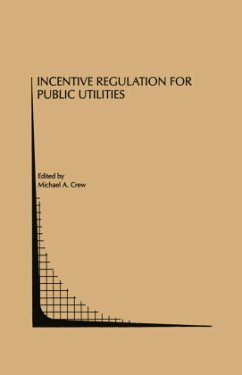
Price Caps and Incentive Regulation in Telecommunications
Versandkostenfrei!
Versandfertig in 1-2 Wochen
115,99 €
inkl. MwSt.

PAYBACK Punkte
58 °P sammeln!
Michael A. Einhorn In continuing to deregulate telecommunications companies, regulators have begun to consider alternative approaches to traditional cost-based price regulation as a means of encouraging monopoly efficiency, promulgating technological innova tion, protecting consumers, and reducing administrative costs. Under cost-based regulatory procedures that had been used, prices were designed to recover the regulated company's costs plus an allowed rate of return on its rate base; this strategy was costly to administer, provided no consistent incentives to cost-ef ficiency and technologic...
Michael A. Einhorn In continuing to deregulate telecommunications companies, regulators have begun to consider alternative approaches to traditional cost-based price regulation as a means of encouraging monopoly efficiency, promulgating technological innova tion, protecting consumers, and reducing administrative costs. Under cost-based regulatory procedures that had been used, prices were designed to recover the regulated company's costs plus an allowed rate of return on its rate base; this strategy was costly to administer, provided no consistent incentives to cost-ef ficiency and technological improvement, afforded many opportunities for strategic misrepresentation of reported costs, and may have encouraged both uneconomic expansion of the utility's rate base and cross-subsidization of its competitive services. A category of alternative regulatory approaches can be classified broadly as social contracts. Under the general strategy of social contract regulation, regulators firstdelimit a group of regulated core services that they continue to regulate and then stipulate a list of constraints that the utility must agree to meet in the future; in exchange, regulators agree to detariff or deregulate entirely other competitive or nonessential services that the utility may offer. As long as no stipulated constraints are violated, the utility may price freely any service; if it reduces costs, it may keep a share of its profits. According to the National Telecommunications Information Administration (NTIA, 1987), social contract agreements of one form or another have been considered or implemented in a majority of American states.














